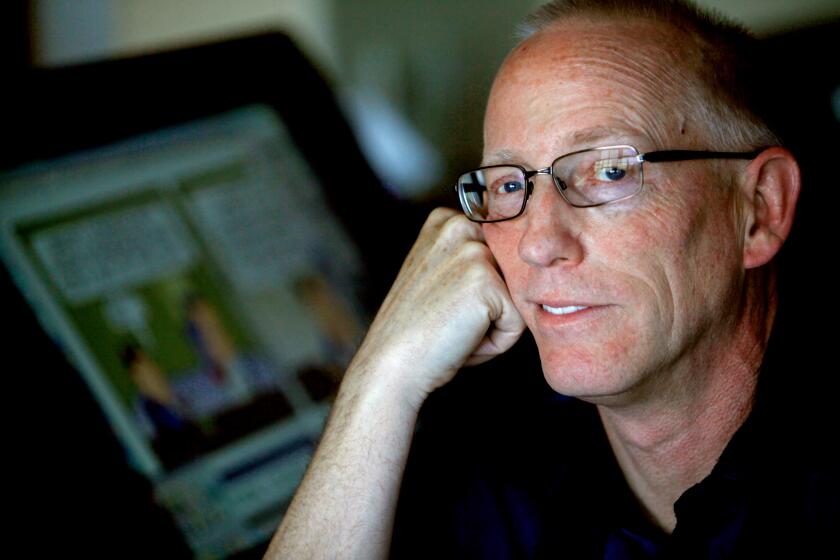Viacom Toys With Discovery Zone Strategy : Entertainment: The new owner of the indoor-playground centers seeks to boost profit through repeat business.
- Share via
CHICAGO — Zoe Netter adores Discovery Zone. She delights in tossing the brightly colored plastic balls, clambering through the maze of tubes and even using the toddler-size potty in the bathroom.
“She loves it,” said the 2-year-old’s mother, Lauren Deutsch. “There’s really no reason kids wouldn’t. It’s set up for kids.”
But kids don’t pay Discovery Zone’s bills; their parents do. And the company wants them to pay more--or more often.
“Repeat business” is Discovery Zone’s new mantra. After vaulting to the top of the indoor-playground industry through rapid expansion in the early 1990s, Discovery Zone’s initial growth spurt is over. It now must squeeze more profit from its existing FunCenters to recover from its 1994 loss of $10.1 million.
How? That’s what Viacom Inc. is pondering. When the entertainment conglomerate bought Blockbuster Entertainment Corp. last year, it also acquired Blockbuster’s 50% stake in Discovery Zone, enough to control the Chicago-based company.
In May, Viacom fired seven Discovery Zone top executives, replacing most with Blockbuster veterans.
Viacom executives declined to be interviewed about plans for Discovery Zone. But the New York-based company has hinted at one strategy by mentioning plans to cross-market Discovery Zone with its other businesses, including Paramount Pictures and the Nickelodeon and Showtime cable channels.
It’s not hard to imagine Discovery Zone party packages featuring Nickelodeon’s popular Rugrats cartoon characters, or FunCenter admission discounts with Blockbuster video rentals. The combination would give parents an incentive to keep coming back.
“I’m sure it could work both ways,” said Blockbuster spokesman Mike Caruso. “Certainly, the DZ name is a well-known brand name.”
When Viacom took over, Discovery Zone had a deal in the works involving Saban Entertainment Inc.’s Mighty Morphin Power Rangers. Discovery Zone’s approximately 330 locations began offering birthday parties with a Power Ranger theme this spring.
Priced at $3 per child over the regular party fee, which averages $8 per child, the Power Ranger parties are selling well, Discovery Zone spokeswoman Debby Robinson said.
“That’s a really good way to market their birthday parties,” banker Terry Ruppe said as he watched son Tim, 5, bounce in the padded trampoline area of a Chicago Discovery Zone. “My son really likes the Power Rangers.”
But some parents of 2- to 12-year-olds, DZ’s target market, don’t want products pitched to their kids at play.
“I hate mass marketing that’s geared to children. I don’t even let my daughter watch Disney cartoons because I don’t want her to fall in love with mass-marketed products,” said Deutsch, a former print-shop owner and free-lance photographer who is now a full-time homemaker in Chicago.
Disney should be Viacom’s marketing model, said investment analyst Michael Moe, who follows Discovery Zone’s stock for Lehman Brothers Inc.
“At Disney World, you don’t think you’re being exploited. When you buy the licensed product, Lion King or whatever, you don’t think you’re being exploited,” he said.
“That’s the challenge Viacom has with Discovery Zone, to successfully leverage these other products, yet at the same time make sure parents don’t feel they’re being exploited,” he said.
Moe said that building repeat business may depend on making the Discovery Zone experience more rewarding for parents.
“I think it’s the parents that get tired of it,” he said. “Kids seem to love them. My kids beg to go.”
Family entertainment consultant William Haralson agreed: “The idea of spending endless amounts of time watching your kids go through a ball-crawl, I think that would grow old rather quickly.”
While FunCenters are crowded and extremely noisy on weekends during cold-weather months, they’re quieter on weekdays. Many outlets offer discounts from the average fee of $6 per child to attract business then.
*
Haralson, of William Haralson & Associates Inc. in Dallas, said that indoor playgrounds aimed at toddlers and grade-school children inevitably struggle because of their limited target market.
A more viable concept, he said, is the family entertainment center, with attractions that include dining, drinking, miniature golf and virtual-reality games in addition to indoor playground equipment.
These complexes are beginning to appear around the country, led by a chain called Dave & Buster’s. Discovery Zone is working on such a project, dubbed Metro Zone, using elements borrowed from smaller family entertainment centers in Chicago suburbs that Discovery Zone acquired in 1993 and 1994.
More to Read
The biggest entertainment stories
Get our big stories about Hollywood, film, television, music, arts, culture and more right in your inbox as soon as they publish.
You may occasionally receive promotional content from the Los Angeles Times.










